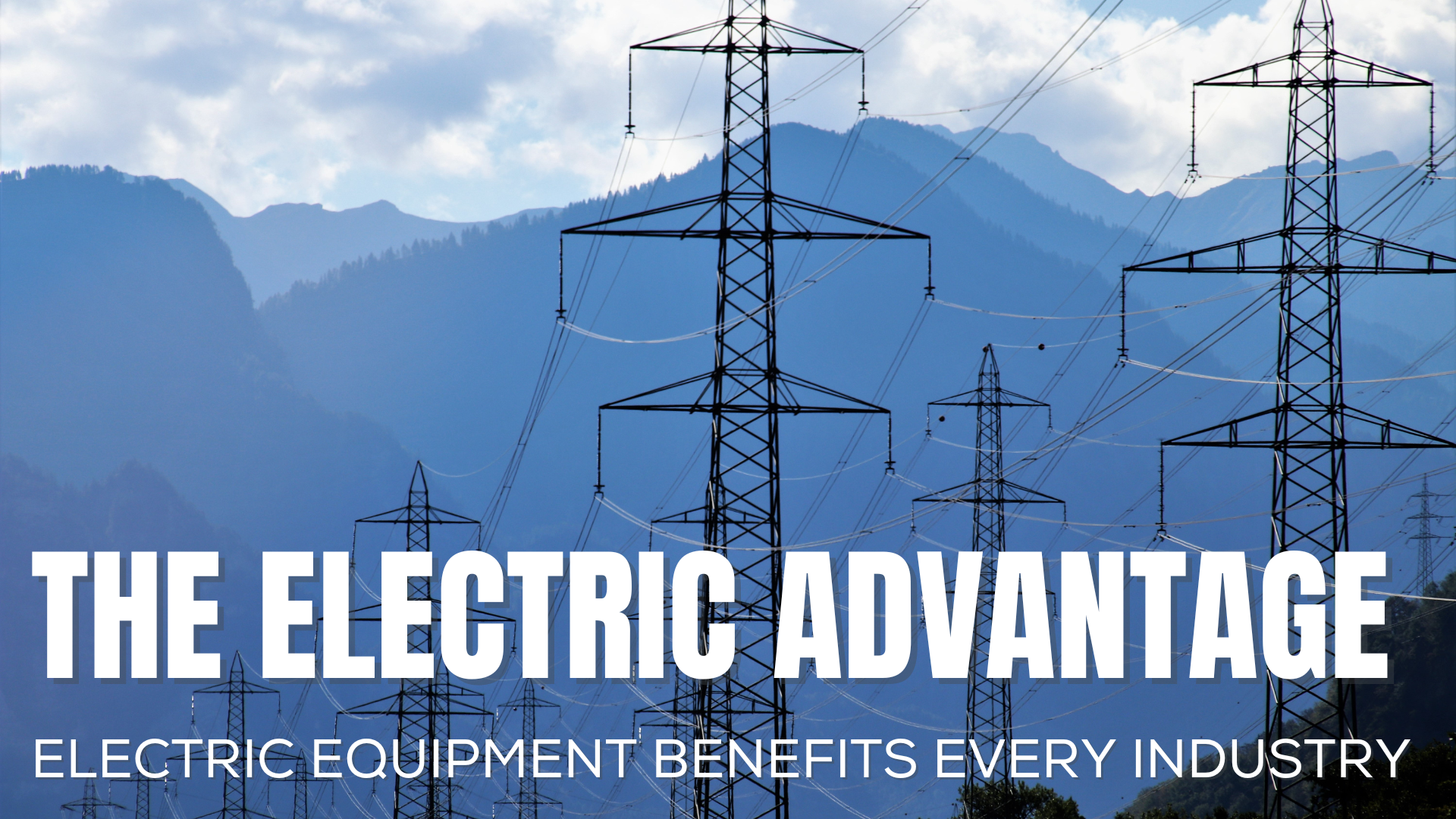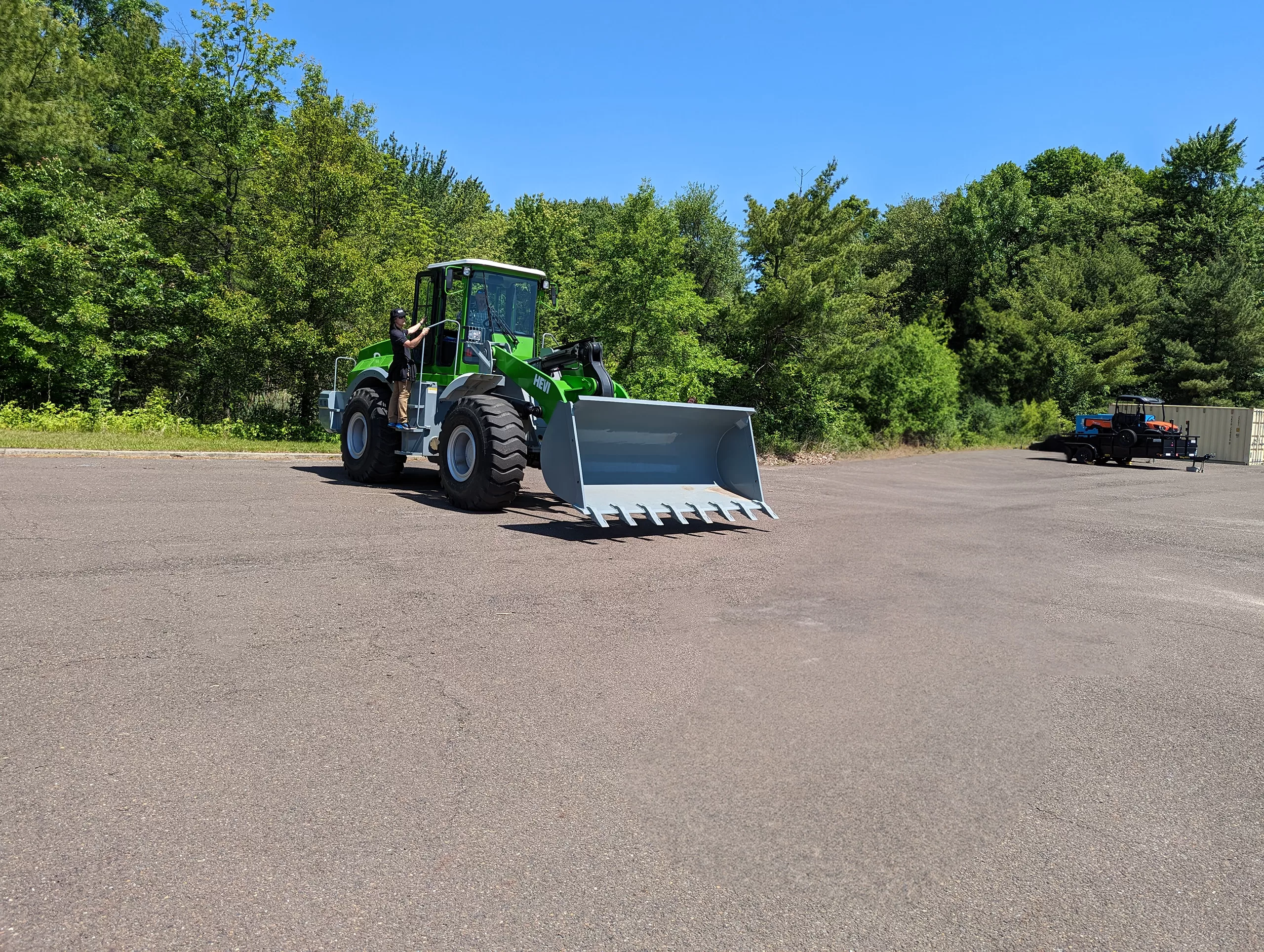The Electric Advantage: Electric Equipment Benefits Every Industry
August 18 , 2022

Electric Equipment Benefits: Waste Management
The Waste Management subsector is one industry where the many electric equipment benefits really stand out. It’s easy to see how electric equipment can protect your workers and keep your company flexible as regulations increase.
Noise Reduction

Hazardous noise can result in permanent hearing loss. Waste management is already a noisy business, and without factoring in any equipment noise, many waste facilities generate noise at 85 dbA from their various processes. When you add in excess noise from material movements (glass or metal clanging) as well as that of the internal combustion engines roaring on site, you can see that hazardous noise levels can reach dangerous heights. The OSHA limit for hazardous sound exposure is 90 dbA – but your employees might be exposed to sounds louder than that when working on-site.
According to OSHA, workers shouldn’t be exposed to 100 dbA sound exposure for more than 2 hours a day. This is not without reason, of course: 34% of workers in the relevant subsector are exposed to hazardous noise. Across all subsectors in the Services industry, 10% of workers overall report hearing difficulty, and 13% report that they have hearing impairment in both ears.
With HEVI equipment, there’s no internal combustion engine, and therefore no sound for a muffler to reduce. In fact, the loudest component on our equipment is the radiator fans, which come in at around 73 dbA. This sound, however, will only persist for a short moment as the idle and normal operation sounds from the equipment fall well below this initial sound, and as a result is below the OSHA limit. Electric equipment benefits waste management workers as much as the environment!
Zero-Operating Emissions from Electric Equipment

Let’s face it: Environmental, Social, and Governance (ESG) reports are becoming more important for investors and customers every day. Likewise, governments and corporations are setting more ambitious sustainability goals in the fight against climate change. With waste management serving as one of the greatest contributors to greenhouse gas emissions in the country, everyone is watching to see how the sector will trim its output. You can lead the way by switching away from internal combustion engines wherever you have them – forklifts, trucks, and of course, heavy equipment like front loaders.
HEVI’s electric equipment has no operating emissions, of course, so when you upgrade your fleet to our all-electric equipment, you’ll be taking a big step towards your ESG goals.
Less Maintenance Means Less Waste Management (For You!)

It’s no secret that internal combustion engines require way more maintenance than electric motors. The sheer number of moving parts, along with the necessary fluids to keep them running, means that your diesel equipment is setting you back a hefty amount. Beyond that, hazardous diesel fuel or other fluid spills can not only wreck your wallet, but also create a huge headache with the EPA. It’s likely that government regulations are already causing a headache for your diesel-based operations.
Without having to maintain your diesel engine and storage components, we estimate a 40% annual reduction in maintenance costs. On top of that, with the price of diesel around $6 a gallon, you’ll save around $70,000* on fuel alone by switching to HEVI’s all-electric equipment. With fewer necessary fluids and fewer moving parts, you’re doing more than managing your clients’ waste – you’re generating less yourself.
As you can see, HEVI equipment is the way to go for waste management applications. Not only does it bring all the power and utility you need, but it also keeps you and your workers safer and healthier while letting you save money on operating costs and keeping up with your ESG goals.
*Based on $6 per gallon diesel cost with an operational use of 6 gallons per hour, and 15.45 cents per kWh electricity cost with an operational use of 15 kW per hour. Savings are based on an 8-hour work day, 5 days a week.
Electric Equipment in Agriculture
Agriculture is one industry where the many electric equipment benefits really stand out. It’s easy to see how reducing emissions can help farmers – your crops and livestock both need clean air to produce.
Here’s how swapping your farm’s fleet to electric can revolutionize your job site.
Noise Reduction on Your Farm

Hazardous noise can result in permanent hearing loss. Agricultural equipment and even livestock can generate sounds loud enough to qualify as hazardous. Grain dryers, tractors, loaders, and even chainsaws emit noise that can easily damage an unprotected ear. For instance, the OSHA limit for hazardous sound exposure is 90 dbA. An average tractor can hit 100 dbA.
According to OSHA, workers shouldn’t be exposed to 100 dbA sound exposure for more than 2 hours a day. You’d think you could give your operators appropriate protection, and they could ride your tractor all day long. However, even with the current and regular use of hearing protection, 15% of workers in the Agriculture, Forestry, Fishing and Hunting (AFFH) sector suffer from hearing loss. This is likely because 74% of noise-exposed workers in that sector report not wearing hearing protection. If you or your staff fall into that category, you’re risking material hearing impairment that impacts your day-to-day life.
With HEVI equipment, there’s no internal combustion engine, and therefore no sound for a muffler to reduce. In fact, the loudest component on our equipment is the radiator fans, which come in at around 73 dbA at startup, already well below the OSHA limit, before getting even quieter. Electric equipment benefits your ears as much as the environment!
Zero-Operating Emissions from Electric Equipment

Each year, agricultural equipment kills 700 people from pollution alone. Diesel exhaust contains what’s known as DPM – diesel particulate matter. Exposure to DPM can experience a variety of effects and illnesses, from dizziness to cardiovascular disease. In contrast, other farm-related fatalities total roughly 400 per year, making diesel a major danger for you and your operators. Although we know air pollution is a major ecological concern, we often forget that people are a part of our ecosystem. This means you and your workers are constantly putting yourselves at risk when operating in a polluted environment.
HEVI’s electric equipment has no operating emissions, of course, so when you get HEVI, you are reducing the physical harm done not only to your workers, but to those around you.
Reduce On-Site Hazards and Liabilities
Acquisition of diesel fuel is a major part of fleet management, and for any operations that require on-site tanks, both the actual and potential costs are very high. Diesel is a hazardous material, and as such its storage is covered by a huge number of regulations that ensure on-site safety. Even after you’ve acquired your permits and paid for the appropriate containers and installed it all, the diesel itself is still a headache and a liability. You’re still managing your equipment idle times, which can cost 15-20% of all the fuel you’ll use on a given project, and making sure to protect the diesel from theft.
HEVI, on the other hand, provides three separate charging solutions, each one free from the difficulties of hazardous material management. To top it all off, idling alone uses barely any battery, giving you a better return on investment for those moments when your logistics are held up.
Electric Equipment Costs Less

It’s no secret that internal combustion engines require way more maintenance than electric motors. The sheer number of moving parts, along with the necessary fluids to keep them running, means that your diesel equipment is setting you back a hefty amount. Beyond that, hazardous diesel fuel or other fluid spills can not only wreck your wallet, but also create a huge headache with the EPA. It’s likely that government regulations are already causing a headache for your diesel-based operations.
Without having to maintain your diesel engine and storage components, we estimate a 40% annual reduction in maintenance costs. On top of that, with the price of diesel around $6 a gallon, you’ll save around $70,000* on fuel alone by switching to HEVI’s all-electric equipment.
As you can see, HEVI equipment is perfect for work on the farm. Not only does it bring all the power and utility you need, but it also keeps you and your workers safer and healthier while letting you save money on operating costs.
*Based on $6 per gallon diesel cost with an operational use of 6 gallons per hour, and 15.45 cents per kWh electricity cost with an operational use of 15 kW per hour. Savings are based on an 8-hour work day, 5 days a week.
Municipalities & Electric Equipment Benefits
When thinking about heavy equipment, we often think of large construction sites or sprawling farms. Municipalities, however, are another often unseen source of heavy equipment labor. When roads need salting or a pipeline is being built, municipalities are the ones placing orders and hiring crews. Increasingly, as the world moves towards a greener future, municipalities and their residents are thinking about the negative effects their daily activities can have on the environment. We’ve already seen unprecedented support for the adoption of electric busses and trucks. Furthermore, mayors and town councils are pushing the adoption of clean technologies at an increasing rate – their residents want it, their state and federal governments want it, and their budgets, stretched in part by the fluctuations in diesel pricing, practically demand it.
From laying new pipe to moving mulch, property management requires a variety of tasks that utilize heavy equipment. With diesel being the old standard, municipalities haven’t had many opportunities to reduce their emissions and go green with their equipment fleets. HEVI equipment is the perfect solution for helping your town meet new environmental goals while providing an improved experience for both operators and the local community.
Electric equipment benefits local governments on so many fronts, from appeasing citizens to cutting costs. Let’s dive into some of the ways HEVI can help you bring your town into the new frontier of electrification.
Diesel is Dangerous
Let’s begin with safety. Any town that stores large quantities of diesel fuel at their municipal facilities faces a slew of risks, both to your budget and the safety of your employees and residents. For one, diesel fuel is expensive to properly store, as any on-site tank must be specially designed to meet environmental regulations. Any spills or mishaps that might occur are a huge liability – especially as diesel’s highly flammable nature makes it a fire or explosion risk.
Beyond the material risks to people at your facilities, your budget will suffer as well. On top of the various expenses relating to permitting and securing the fuel, fuel theft accounts for a significant percentage of the overall costs of managing a diesel supply, and requires expensive telemetric systems to monitor and control. If you’re operating a fuel depot for various tasks across multiple sites, the need to plan downtime for refueling and sorting your fleet becomes a big drain on resources.
Electric equipment, on the other hand, can eliminate these hurdles.
Electric is Healthier
Health and safety are the first and most obvious of all the electric equipment benefits for municipalities. With zero operating emissions, HEVI’s loaders, excavators, and forklifts not only reduce your impact on the environment, but also remove harmful diesel particulate matter (DPM) from the air. Whether you’re working indoors or out, the absence of emissions will improve health outcomes for your operators as well as the residents around your sites.
Noise is also a critical benefit of switching to electric equipment. Particularly for the work municipalities require, which can often take place right in the middle of busy communities, HEVI equipment’s low noise levels are a huge quality of life increase. A diesel engine is literally harnessing explosions to do its work – which means residents will be suffering from all that noise as you work to improve their community spaces. Give your residents some peace by swapping to electric equipment that’s so quiet, you can have a conversation right next to it as it runs.
Logistics Redefined
The noise and emissions benefits are clear victories for your town, without even addressing the logistical hurdles it can help you overcome. Without diesel tanks and refueling stations, your municipality can avoid the costs associated with maintaining a fuel supply. From fuel storage to refilling tanks, many old processes and systems will become defunct – and you can funnel those resources into maximizing the output of your electric equipment while still saving money. Investing in DCFC charging infrastructure in available commercial and industrial zones, you can create not only an easy-to-manage refueling process for your vehicles, but also a useful network to help facilitate the electrification of other vehicles, like trucks and busses. This network will also help the public at large, as their new EVs will be able to charge at work or while shopping.
If the DCFC charger installation process is too much, HEVI provides multiple charging solutions to enable you to realize all of the aforementioned electric equipment benefits with ease. The smallest and most flexible of these options, HEVI’s DCH220-10 can be used with common 220V outlet, the same outlet that electric dryers use. With this flexibility, almost any site, whether residential or commercial, can become a charging station for your equipment. Our other non-stationary charger is the DCH480-30. This option enables you to reduce your charge time by running electricity through a 480V line. Although 480V outlets often require specific permits and installation, the DCH480-30 reduces overhead compared to diesel tank installation. For any municipal operation that sees its electric equipment at a single site for long durations, the DCH480-30 can enable continuous uptime with simple overnight charging.

